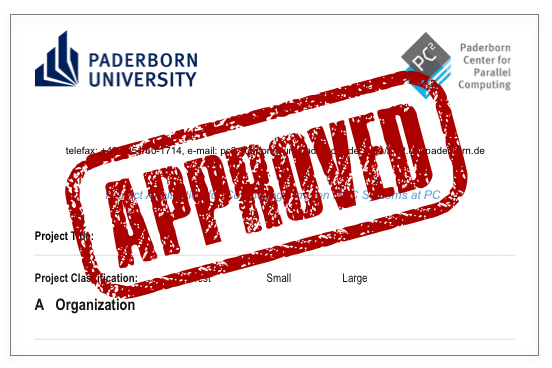Paderborn/Germany, April 8 2019 – The resource allocation board of the Paderborn Center for Parallel Computing (PC2) has approved the allocation of 156 million core-hours to 59 computing projects. Overall 13 large projects, requesting more than 2 million core-hours and 46 small projects (below 2 million core-hours) have been approved thereof 19 external projects of principal investigators not affiliated with Paderborn University. 76% of the allocated computing time has been granted to users from Paderborn University, 10% to users at other scientific institutions in North Rhine-Westfalia and 14% to researchers from other states in Germany. The supported projects are predominantly from the domains of condensed matter physics, physical chemistry, electrical- and mechanical engineering, and computer science. The 2019-1 call was the first call, where users could apply for resources on the new Noctua system at PC2. 21 projects have been allocated 80 million core-hours on this system alone. Three projects have been assigned 10 million or more core-hours on Noctua:
- Condensed matter physics: "Photonic materials from ab-initio theory" under the principal investigator Prof. Dr. Wolf Gero Schmidt, Paderborn University (17 million core-hours on Noctua)
- Physical chemistry: "DFTB calculations on water catalysis" under the principal investigator Dr. A Henao Aristizábal, Paderborn University (14.4 million core-hourse on Noctua)
- Computer science: "On-the-fly machine learning" under principal investigator Prof. Dr. Eyke Hüllermeier, Paderborn University (9.9 million core-hours on Noctua and 9.9 million core-hours on Oculus)
"We are pleased to have received so many high-quality proposals from a large variety of different scientific disciplines and institutions. We are particularly encouraged that 7 projects using FPGA resources will be funded, indicating the emerging interest for this accelerator technology, which is a key competence of PC2. We have also seen steeply increasing interest in GPUs. This confirms the trend to use accelerators, which we will consider for future HPC system procurements", says Prof. Thomas D. Kühne, chairmen of the resource allocation board.
The newly approved projects will start on April 8.
Computing time on the HPC systems operated by PC2 is allocated for a period of 12 month on a competitive basis after a technical and scientific evaluation in a peer review process. For large projects there are two calls per year. The last call for proposals (2019-1) is available here. The next call for proposals will be opened in Juli 2019 and the next allocation period will start on October, 1 2019.
Further Information
Prof. Dr. Thomas D. Kühne
Chairman PC2 Resource Allocation Board

